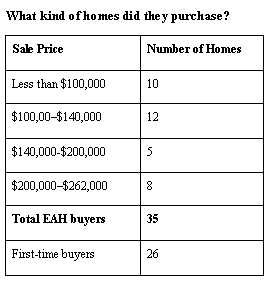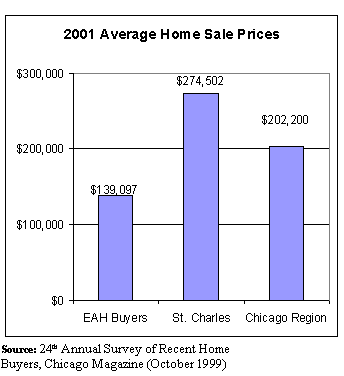Employer-Assisted Housing: 2001 Year-end Report

The employer-assisted housing (EAH) initiative undertaken by the Metropolitan Planning Council (MPC) in collaboration with nonprofit housing organizations and regional employers had a banner year in 2001. Since early in 2000, the first model program has been providing homes for St. Charles-based System Sensor employees. In 2001, five new partners signed on to develop employer-assisted housing initiatives and the effort received broader recognition, including new incentives from the state of Illinois and awards from outside organizations.
New Partners
As System Sensor and the Joseph Corporation housing counseling agency continue their success in helping employees buy homes closer to work, five new partners have decided to create EAH programs. Each model is slightly different. The City of St. Charles approved $25,000 to fund counseling and program administration to encourage local employers to offer employer-assisted housing programs to their workforces. The Village of Riverdale will offer an employer-assisted housing program to municipal employees to encourage them to buy homes in Riverdale. The Village views this as a reinvestment program, strengthening and stabilizing the local housing market. The Village is also encouraging local employers in Riverdale to participate by offering to cover some of their counseling costs. Sinai Hospital in Chicago moved forward with plans to launch a program offering a financial incentive to nurses to purchase homes in the Lawndale neighborhood. Hospital officials hope the program will help them retain staff, while at the same time strengthening a neighborhood in need of reinvestment. NHS of Lawndale, Lawndale Business and Local Development Corporation, the University of Illinois at Chicago, and MPC have provided support to the hospital. Bank One, based in Chicago, has committed $500,000 to provide down payment assistance to 150 employees across the country. Northwest Community Hospital, located in an expensive housing market, hopes its EAH program will make it a preferred employer to retain employees in key health care positions who could not otherwise afford to live near work.
State Incentives for Employer-Assisted Housing
This year, more incentives have emerged for employer-assisted housing programs, raising significant interest among employers across the region. In August, Gov. George Ryan signed a state donations tax credit into law. Participating Illinois corporations and individuals will receive a $.50 credit toward their state income tax for every $1 in cash, land or property donated for affordable housing creation. The state aims to stimulate private sector investment, generating a total of $26 million per year for affordable housing over the next five years. In addition, $4 million in state money has been allocated for employer-assisted housing programs that benefit households earning no more than 120 percent of the region’s Area Median Income ($85,000 for a family of four in the Chicago region). Eligible programs may include down payment assistance, reduced interest mortgages or rental subsidies to help employees find and finance homes near work. An additional $2 million is reserved for technical assistance to support EAH programs, including counseling and other administrative costs.
In April 2001, the Illinois Housing Development Authority (IHDA) approved $268,000 to stimulate private investment in employer-assisted housing in northeastern Illinois. The state money is being used to provide funds for down payment/closing costs to match employer commitments dollar-for-dollar, and to reimburse the counseling/homebuyer education costs for successful buyers. In addition to these matching funds, IHDA has offered to make below-market interest rates available to EAH program participants. This initial allocation targets employers working with MPC and one designated Regional Employer-Assisted Collaboration for Housing (REACH) partner for each county in the Chicago region. REACH partners include the Interfaith Housing Development Corporation (serving the North Shore), the Affordable Housing Corporation of Lake County, the Joseph Corporation (based in Aurora), the Corporation for Affordable Homes of McHenry County, the North West Housing Partnership, the DuPage Homeownership Center, Neighborhood Housing Services and the South Suburban Housing Center.
Kudos to REACH and System Sensor
MPC and its nonprofit REACH partners received outstanding awards and recognition in 2001. In November, the program was awarded a grant from Fannie Mae as well as a BP Leaders Community and Economic Development Award. The BP award granted the REACH collaborative $100,000 for building capacity in its community based organizations to expand EAH program implementation. System Sensor was also praised for its trend-setting efforts in EAH. Former CEO King Harris received Bank of America’s Community Leadership Award for initiating System Sensor’s EAH Program and advocating among his peers for programs like it.
The Employer-Assisted Housing Program at System Sensor
To maintain its business edge through innovative workforce benefits, System Sensor developed a unique EAH program that assists employees in buying homes closer to work. This reduces employee commute times, and decreases levels of tardiness and turnover. To qualify for the program, workers must be in good standing, have completed at least one year with the company, and earn less than $63,800. Eligible employees are referred to the nonprofit Joseph Corporation for homeownership counseling and receive a $5,000 forgivable loan from System Sensor at closing. The home they buy must be within 15 miles of the plant and closer to work than the employee’s current home. The employee must contribute $1,000, or 1 percent of the purchase price. Joseph Corporation works with employee buyers, providing credit counseling and other assistance throughout the homeownership process, and attending the closing to ensure a smooth transaction and to deliver the $5,000 check. If the worker stays with the company for five years, the $5,000 loan is forgiven. In addition to assisting with the startup process of developing the program, MPC provides ongoing evaluation, marketing and technical assistance to Joseph Corporation and System Sensor.

Background
In 1999, System Sensor conducted an employee housing survey that was prepared by MPC and Joseph Corporation. The survey, completed by 98 of 850 employees, found that:
- Over 50 percent thought that housing costs were too high in the western suburbs
- Over 50 percent believed that credit and/or financing problems would make homeownership difficult
- Over 50 percent spent more than 30 minutes commuting to work and 10 percent spent more than 60 minutes in transit.
Once System Sensor had assessed broad interest in a housing program, Joseph Corporation held a homeownership fair at the plant in late 1999. It was attended by 35 employees. In response to additional marketing in 2000, 29 more employees submitted eligibility applications. Fifty of these 54 applicants were eligible and were referred to the Joseph Corporation. Twenty-four more people submitted applications to participate in the program in 2001. All of these individuals have met with a Joseph Corporation housing counselor.
What’s happened to these Employer-Assisted Housing participants?
- 35 became new homeowners from January, 2000 to December, 2001.
- 74 are working with Joseph Corporation to repair their credit record, obtain financing or find a house.
- One left System Sensor and repaid the $4,500 owed of the $5,000 grant.
- After purchasing a home, one employee passed away. The loan was forgiven.
- In the economic downturn, two workers were laid off. If they are not rehired, the loans will be forgiven.


Who are these buyers?
- Participating employees’ median income was $32,000. Their household median income was $48,000.
- They averaged seven years of employment with System Sensor.
- 24 were members of racial or ethnic minorities.
- 26 were first-time homebuyers.
Program Administration
System Sensor contracts with the nonprofit Joseph Corporation for homebuyer counseling and program administration, relieving Human Resources Director Dick Braun of most paperwork. Mr. Braun estimates that he spent a total of less than 40 hours administering the program in its first year. He continued to devote limited time to the program in 2001, committing approximately 10 to 15 hours each quarter in 2001 to reviewing eligibility applications, ordering checks for down payment assistance and answering questions about the program.
Joseph Corporation staff devoted approximately 250 hours to the program in each quarter of 2001. This includes approximately 175 hours of individual counseling sessions and approximately 75 hours administering the program, attending closings and preparing and filing the necessary paperwork for the counseling and closings.
System Sensor Cost/Savings Analysis
System Sensor estimated significant savings due to reduced turnover, recruitment and retention costs resulting from its employer-assisted housing program. In its first year, the program helped 16 employees buy homes, and helped 19 in its second year. Overall, System Sensor calculates the program resulted in savings of $225,000 over 2 years.
Other Benefits to System Sensor
System Sensor credits its EAH program with reducing turnover and absenteeism and boosting morale and loyalty. The program is also an innovative addition to a benefits package for recruiting new employees. Companies participating in EAH programs further benefit through improved public relations: System Sensor’s EAH program has received local and national attention, including a mention in the Wall Street Journal, a profile in Newsweek, and stories in the Daily Herald, Kane County Chronicle and Chicago Tribune.
Third Quarter and Fourth Quarter 2001 Achievements
- Ten new families bought homes through System Sensor’s EAH program.
- The median income of 3rd and 4th quarter participating employees was $28,000.
- The median household income of 3rd and 4th quarter participating homebuyers was $47,084, well below the Chicago regional median household income of $63,800.
- The median home price of 3rd and 4th quarter participating workers was $146,000, as compared to the Chicago region’s median home sale price of $202,000.
Conclusion
Housing assistance is a benefit an employer can easily afford to provide. An investment ranging from $1,000 to $5,000 per employee can produce a return on investment in less than one year. With some financial assistance and homeownership counseling, many workers can become homeowners. The nonprofit housing counseling agency plays a critical role not only in providing credit counseling and homeownership assistance but also in promoting the program to workers who may not believe they could ever own a home or that their employer would help them. With a small investment, an EAH program distinguishes a company in a tight labor market and pays for itself quickly.
For more information:
- Samantha DeKoven, housing associate, Metropolitan Planning Council, at 312/863-6021 or
- Greg Schiefelbein, executive director, the Joseph Corporation at 630/906-9400.
MPC is deeply grateful to the following whose funding made this work possible:
Fannie Mae Foundation
Bank of America
U.S. Bancorp Piper Jaffrey
Pittway Corporation Charitable Foundation
North West Housing Partnership
Old Kent Bank